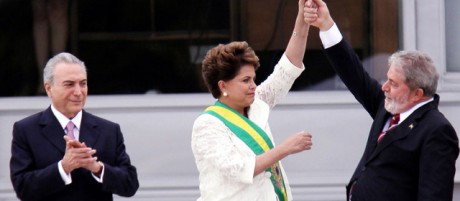


Petra Costa: The Edge of Democracy

”There is so much to say about this first feature documentary by young Brazilian director Petra Costa. So much positive because of its visual brilliance and so much because of the way it treats its painful theme…”.
This was written almost 7 years ago after I had seen ”Elena”, a film that toured the festival circuit and created expectations for Costa’s next film. Which was excellent as well. ”Olmo and the Seagull” came out in 2014, a film she wrote and directed together with Danish Lea Glob – a work that Allan Berg praised on this site in his analysis, link below, for its portrait of a creative process, with references to theatre, to Chekhov, and to Virginia Wolf. Berg expressed his content that here was a Film and that he did not have to write about documentary or fiction. Words to that effect.
If you substitute ”first” with third in the quote above, Petra Costa’s third film
”The Edge of Democracy » is indeed dealing with a painful theme. It is a film that is based on documentary material but in many ways constructed as a drama: The recent development of Brazilian politics told from the director’s personal point of view, the loss of the dream of democracy –with a tone that you could call sad, a melancholy that associates to Chekhov. There is no Brazilian clichés, no bossa nova (before the end credits), no Copacabana, no Gilberto Gil. At the same time as the drama between the political protagonists is – to say the least – Shakespearean:
Look at the photo – you see the popular, charismatic, the man from the working class, Lula pass on the presidency to Dilma Rousseff, who is from the same party as him, the Worker’s Party, PT, but note the man to the left, Michel Temer, the vice-president from the PMDB party, who – as Costa says in her personal voice-off – was waiting to take over, contributing to the impeachment of Dilma… Temer was President for a couple of years until he, as many others, was arrested for involvement in financial operations to be cathegorized as corruption. He was followed by another criminal, Bolsonaro, whose references go back to the military dictatorship that ended in 1984, the year Costa was born.
The film is full of details about the financial scandals, about how power corrupts; for someone whose knowledge of Brazilian politics is little, it is complicated to follow, but you get it all due to Costa’s commentary and due to her open position and cinematic skills:
Her parents were in opposition to the military dictators. As Dilma Rousseff her mother was imprisoned and tortured, but her family was also part of the elite and often during the film, like when Bolsonaro was elected president, she says “many in my family voted for him”. Costa’s sympathy lies with Lula and Dilma, she has access to them and there are fantastic scenes with the two, mostly shot in cars, where you get close to them. Dilma during the impeachment process: “I am K, a Kafka’sque character, but a K with a lawyer…”, she says ironically, and with Lula it is amazing to follow him, when he is sentenced to prison and the crowd shouts at him “don’t turn yourself in”. Which he did. 12 years.
Petra Costa takes me as the schocked viewer, who lives far away from the big wonderful country – as in her first film – but here using archive material to guide me through one corruption after the other, sometimes you feel that you are watching a thriller (¡) – with visual brilliance to the presidential palaces, to the utopian capital Brasilia that separates the elite from the people, to family archive, to close-ups of Dilma and Lula, to a scene where a cleaning lady in the President’s Palace says that “there is no democracy in this country”, to her own statement that the divided country is run by some few families… To Dilma, in a conversation with Costa’s mother, saying that being a President you have lost your freedom.
Quite brave by a young director to combine complicated reportage material with a personal angle and narration. A film full of painAn inspiration it must be for other documentarians!
Brazil, 2019, 1 hour 53 mins.
Available on Netflix.